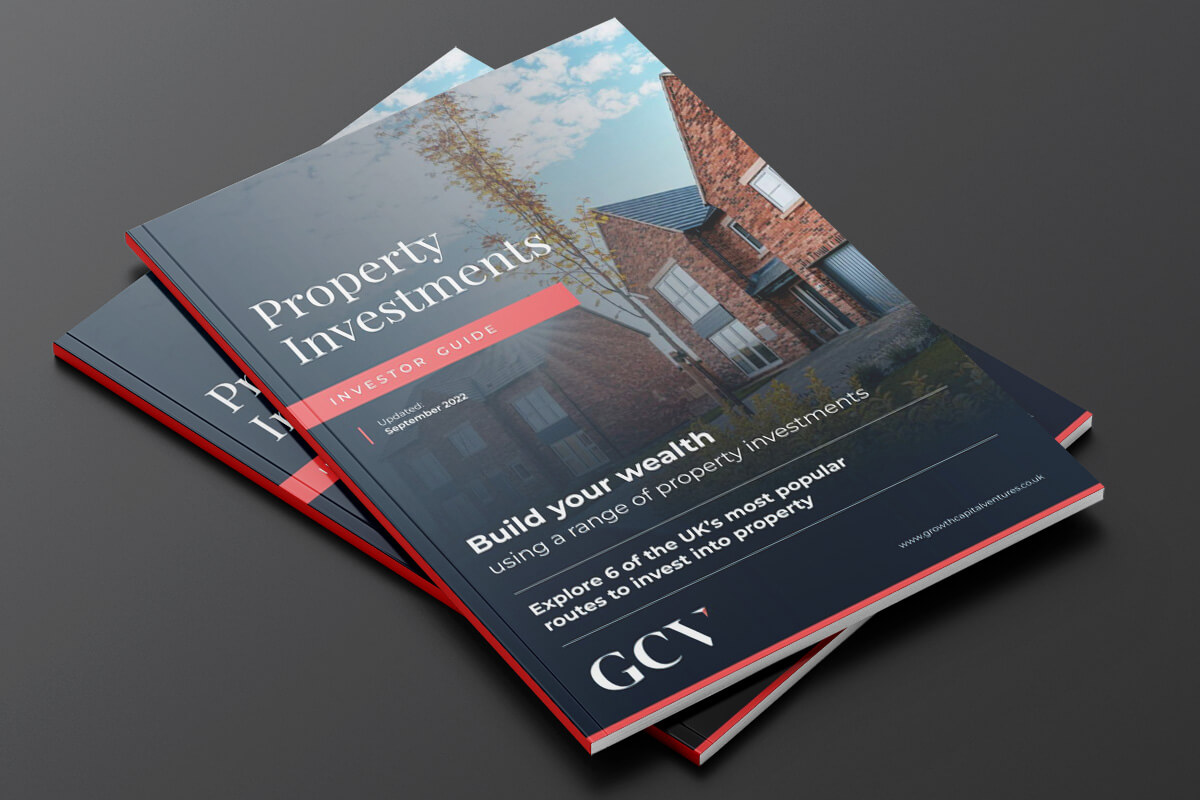
Property Investments Explained
One of the UK's most popular asset classes, property investment allows individuals to invest in residential and commercial real estate, benefiting from the potential for rental income and capital growth while targeting attractive long-term returns.
Homes by Carlton
GCV Partner
What are Property Investments?
Property investments refer to the purchase, ownership, management, or sale of real estate assets with the goal of generating income, capital growth, or both. These investments can include various property types, such as residential homes, commercial buildings, industrial facilities, or land.
Investors often earn returns through rental income from tenants or by selling properties at a higher value after market appreciation or strategic enhancements. Property investment is considered a relatively stable and tangible asset class, as real estate tends to hold intrinsic value over time.
Additionally, property investments can offer diversification to an investment portfolio and may provide tax advantages, such as deductions on mortgage interest or maintenance costs. While the potential for consistent income and long-term growth is appealing, property investments also come with risks, such as market fluctuations, maintenance expenses, and the challenges of property management, making thorough research and planning essential.
Please Note:
The value of investments and any income from them can fall and you may get back less than you invested. Please note that this article has been prepared as a general guide only and does not constitute tax or legal advice.
1. What Are Property Investments?
A Clear Introduction to Real Estate as an Investment Option
Property investments involve purchasing real estate with the goal of generating income or capital appreciation. By owning property, investors can earn rental income or sell the property at a higher price over time, benefiting from market growth. Real estate offers a tangible and stable investment option, contrasting with more volatile markets like stocks. Investors in property can choose from residential, commercial, or industrial real estate, each offering unique benefits and risks.
Investing in property can be a straightforward way to build wealth, but it requires careful research, a clear understanding of the market, and the ability to manage properties effectively. Whether for long-term capital gains or consistent income through rents, property investment remains a reliable option for many investors.
2. Types of Property Investments
From Residential to Commercial: Exploring the Opportunities
When it comes to property investments, there are several types to consider, each with its own set of advantages, risks, and opportunities. Understanding these different property categories is key to making informed decisions and choosing the right investment strategy.
Whether you're interested in residential properties for stable rental income, commercial real estate for higher returns, or land for future development potential, each type of property offers unique benefits.
1. Residential Property
This includes single-family homes, apartments, and multi-family units. Residential properties are typically the most accessible and popular for first-time investors. They provide steady rental income and long-term capital appreciation, particularly in high-demand areas.
2. Commercial Property
Commercial real estate involves office buildings, retail spaces, or warehouses. These properties often offer higher returns due to longer lease terms and larger tenants but may come with higher entry costs and more complex management requirements.
3. Industrial Property
Investing in industrial properties like factories, distribution centers, or storage facilities can offer steady returns. With the growth of e-commerce, industrial spaces are in high demand, making this a potentially lucrative area.
4. Land Investment
Land investment involves purchasing undeveloped plots of land. Although it may take longer to realize returns, land can appreciate significantly over time, especially in areas with future development potential.
3. How Property Investments Generate Returns
Understanding Rental Income, Capital Growth, and More
Property investments can generate returns in multiple ways, offering investors a diverse set of opportunities to grow their wealth. Whether it's through regular cash flow or the long-term appreciation of property values, understanding how these returns work is essential for making informed investment decisions.
Here’s how property investments typically generate returns:
Rental Income:
This is the income earned from renting out a property. Investors typically receive regular cash flow, which can be a steady source of income. The amount of rental income depends on the location, type of property, and the rental market conditions.
Capital Growth:
Over time, properties tend to appreciate in value, particularly in areas with strong demand. Capital growth occurs when the value of the property increases, allowing the investor to sell the property for a profit. This type of return is often realized in the long-term.
Tax Benefits:
Property investors may benefit from tax deductions, such as mortgage interest, property maintenance, and depreciation on the property. These deductions can help reduce the overall tax burden, increasing the profitability of the investment.
4. Benefits of Investing in Property
Stability, Tangibility, and Long-Term Wealth Building
Property investments come with several benefits that make them an attractive option for many investors. From the tangible nature of real estate to its potential for long-term wealth accumulation, real estate can play an essential role in diversifying an investment portfolio. Below are some key advantages of investing in property:
-
Stability
Property is often considered a stable investment. Unlike stocks or other securities, real estate typically experiences less volatility, offering consistent returns over time. -
Tangible Asset
Real estate is a physical asset, making it more tangible than stocks or bonds. Owning property provides a sense of security, and its value can be seen and utilized in many ways. -
Long-Term Wealth Building
Real estate investments tend to appreciate over time, offering long-term wealth creation. Additionally, as mortgages are paid down, equity in the property increases, adding to the investor's net worth. -
Diversification
Real estate is an excellent way to diversify your investment portfolio. As a non-correlated asset, property can act as a hedge against market fluctuations and economic downturns.
5. Risks to Consider in Property Investments
Challenges and How to Manage Them Effectively
While property investments can be a great way to generate income and build wealth, they do come with potential risks. Understanding and mitigating these risks is crucial for any investor considering real estate as a part of their portfolio. Below are some of the main risks associated with property investments and how to manage them effectively:
-
Market Risk: Property markets can fluctuate due to economic conditions, interest rates, or local market dynamics. This can impact rental income and property values, especially during economic downturns.
-
Liquidity: Real estate is not as liquid as stocks or bonds. If you need to sell quickly, it may take longer to find a buyer, and you might not get the expected price.
-
Maintenance and Management Costs: Maintaining a property involves regular expenses such as repairs, insurance, and property management fees. Investors must budget for these ongoing costs to ensure the property remains profitable.
-
Tenant Risks: Rental properties come with tenant-related risks, including non-payment of rent or property damage. It's essential to vet tenants carefully and consider having insurance in place to protect your investment.
To mitigate these risks, investors should conduct thorough market research, maintain a financial cushion for unexpected expenses, and have a solid property management plan in place.
Property Investment Guide
Investor Guide to Property Investments
- An overview of each property investment route and its core characteristics
- The risks commonly associated with each route
- The returns each route typically targets
- The typical investor profile suited to each property investment route

Portfolio Diversification.
Superior Returns.
Become a GCV Invest Member
Property investment opportunities with the potential to deliver superior returns.
GCV Invest is a private investor network and sophisticated co-investment platform, formed with the goal of connecting experienced investors with high-growth, impact driven alternatives investment opportunities, the majority of which reside under the asset class of property and venture capital.
Join our Private Investor Network.

FAQs
Find Out More About Investing in Property with GCV
Should you have any further questions regarding the property investment opportunities we offer at GCV or how to invest with us, you can contact our Investor Relations Team at any point - but we've provided a selection of frequently asked questions below that may be of help.
-
GCV Invest is a Private Investor Network for Experienced Investors, Family Offices, and Institutional Investors.
We originate and structure investment into Alternative Investment Opportunities including; Venture Capital, Private Equity, and Property transactions.
Property transactions are Joint Venture Residential Development Opportunities delivered in conjunction with award-winning Regional Housebuilder - Homes by Carlton.
-
GCV Invest was launched to help experienced investors build a more diversified growth-focused investment portfolio.
To become a GCV Invest client, you must meet the following criteria;
Be a high net-worth individual or sophisticated investor. Seeking to invest alongside like-minded individuals and connect with the Alternative Investment ecosystem. Looking to deploy over £10k+ in Alternative Investment Opportunities per annum.
Investment opportunities span three asset classes - Venture Capital, Private Equity, and Property Investment Opportunities.
-
If you would like to join GCV and become part of our Private Investor Network, please contact Millie Haigh (Investor Relations Director) - millie.haigh@growthcapitalventures.co.uk
Dan will be happy to discuss our investment approach and help you understand more about our track record and pipeline of investment opportunities.
Alternatively, you can join online by registering here.
-
There are no joinings fees. Membership of GCV Invest is completely free, giving you access to well researched, carefully selected investment opportunities across asset classes, all with the potential to provide portfolio diversification and superior investment returns.
-
The GCV Investment teams are well networked and use their embedded presence in the key UK property regions. The Property Team has long-standing relationships with landowners and agents through key target regions.
Opportunities are often introduced on an off-market basis, on the strength of longstanding personal relationships, or by professional advisers who are aware of our expertise and ability to work quickly on Property transactions.
-
The GCV investment team target Investment in Joint Venture residential property development projects. These schemes are identified, researched, and selected by our property team in conjunction with our highly experienced delivery partner, Homes by Carlton. Typically transactions are structured where GCV Invest members participate on a deal-by-deal basis, investing between £25k and £250k. With target investor returns on circa 1.5x money on money, usually over a two-year hold period, the JV property investment opportunities provide investors with portfolio diversification combined with positive social and economic impact on a targeted regional level.
-
The GCV Investment Team screen over 50 residential development opportunities per annum and only selects 3 to 5 opportunities for detailed assessment. From those 3 to 5 opportunities the team will assess each project against carefully selected investment criteria. The objective is to ensure only the best possible transactions are made available to GCV Invest Members. The GCV Founders and Investment Team invest personally in each and every Development Project.
-
Yes. We only consider Investment Opportunities where the Development projects are based in the UK.
We only invest in projects where we have a deep understanding of the underlying investment opportunity and its potential to deliver the required target returns and positive social, economic, and environmental benefits.
-
There are no upfront fees or membership fees for being part of our investor network, having access to our opportunities or investing in our opportunities.
For investors, fees are only charged at the point of successful completion of residential development. At this point, 7.5% of the investment gain is charged before funds are provided back to you as an investor.
-
To invest with GCV Invest you must first become a member. The process is carried out online through the GCV Invest Portal.
GCV Invest is aimed at Experienced Investors who are comfortable making their own investment decisions and would like to allocate part of their investment portfolio to Alternative Investments.
The joining process is simple;
1. Create your Account - Open your online GCV Invest Members Account.
2. Complete Identification Process - As part of the joining process we will need to verify your identity and carry out Know Your Customer (KYC) and Anti Money Laundering (AML) checks. These checks are carried out in real-time and you go through the online application process.
3. Investor Appropriateness - The final step in becoming a GCV Investment Member is a short questionnaire to ensure the type of investments GCV provide match your requirements and risk, and return profile.
Once you've joined, you can access each investment opportunity and build your portfolio of well-researched, carefully selected investment opportunities and track performance on your dedicated Client Account through the GCV Invest Online Portal.
-
Performance update reports on portfolio holdings are provided to GCV Invest Members on a quarterly basis. When an investment is sold, GCV distributes cash proceeds to investors.
GCV also has a dedicated and secure Investor Portal enabling GCV Invest members to keep track of their portfolio at any time.
If you have a query that is not answered here please leave us a message or visit our insights page.
Latest Updates
From tax efficient investing to joint venture property investing, our blog is full of news, information and insights.

The 5 Best Long-Term Investments Every Investor Should Consider


The 13 Best High Return Investments In the UK | 2025/26

Subscribe
Let's keep in touch
To keep up to date on news, events and investment opportunities, sign up to our newsletter here.
* You can unsubscribe at any point using the link provided in the footer of all emails, for more information about how we handle data you can view our privacy policy.
%20(3)%20(2).jpg)
